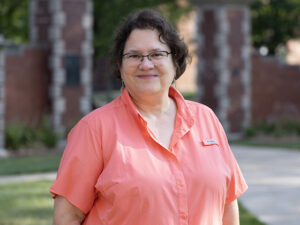Academic Affairs and Dean
The Academic Affairs and Dean’s Office is committed to supporting students and faculty in the pursuit of uncommon academic excellence.

CoryAnne Harrigan
Interim Academic Dean
Office of Academic Affairs
Hillman 24B
Phone: (515) 961-1746
Email: coryanne.harrigan@simpson.edu
Tiffany Quillin
Executive Assistant for Academic Affairs
Hillman 24A
Phone: (515) 961-1720
Email: tiffany.quillin@simpson.edu
Office of Academic Affairs
Mission & Vision
Mission
The Office of Academic Affairs provides leadership and service to maintain and strengthen Simpson College’s high quality academic community. We promote the growth of our diverse and excellent students and faculty through the development and administration of programs, policies and procedures that contribute to the achievement of the college’s mission to provide outstanding undergraduate and graduate education for students of all ages.
Vision
The Office of Academic Affairs strives to be a leader in strengthening and improving teaching and learning by promoting research, scholarship and other creative endeavors among faculty and by finding new and more effective ways to educate and serve our students. We seek to be an exemplar for similar offices at other comprehensive liberal arts colleges and to be recognized among such institutions as a leader in preserving, protecting and promoting the liberal arts approach to learning.
A Statement of the Faculty Regarding
Diversity and Inclusion at Simpson College
We the faculty of Simpson College believe that as an essential component of its mission and history, Simpson College is committed to creating and maintaining a creative, diverse, just and inclusive community in which all develop their abilities to live and thrive in a complex and interconnected world.
Consistent with our educational mission, we recognize ourselves as a community that respects individual identities linked to varying sociocultural characteristics including but not limited to race, ethnicity, gender identity and expression, sexual orientation, national origin, first language, religious or spiritual tradition, age, functional ability, socioeconomic status, physical attributes or familial status.
Further, we recognize that diversity of identities exists in a context of differential power and privilege that we as a community must critically evaluate and engage.
At Simpson College we strive to create a socially just world that honors the dignity and worth of each individual, and we seek to build a community centered on equality, mutual respect and openness to ideas—one in which individuals value cultural and intellectual diversity and share the responsibility for creating an affirming, safe, and inclusive environment.
We recognize that our community is most inclusive when all participate to their full capacity in the spirited, and sometimes challenging, conversations that are at the center of the College’s educational mission to develop personal integrity, moral responsibility, social justice and global citizenship.
Affirmed by the Board of Trustees
What does it mean to be a United Methodist-related College?
History of Education in Methodism
During the second half of the 18th century, John Wesley, a priest in the Church of England, began a revival movement that emphasized a heart-felt relationship with God and a life devoted to personal piety and social justice.
Realizing that education was important for a full life and essential for lifting people out of poverty, Wesley established church programs to teach the children of coal miners around Bristol. In time, he established four schools, one of which still exists as Kingswood School in Bath.
As Methodism grew in North America, the Methodist Episcopal Church continued Wesley’s commitment to social justice and the good of the general community. The church began organizing orphanages, hospitals, retirement homes, and a publishing house as well as schools and colleges. The church even established one of the earliest accrediting bodies in the United States to ensure that its educational institutions met acceptable academic standards and an appropriate connection to the denomination.
Simpson College was founded in 1860 by Methodists who shared Wesley’s commitment to education. We continue to celebrate and value this connection to the United Methodist church and the particular way that Methodism understands education to play an empowering and liberating role in society.
Mission
The United Methodist Church has more formal educational institutions than any other Protestant denomination. United Methodist-related colleges emphasize learning that incorporates a concern for the world community and a rigorous examination of the beliefs and values that students use to interpret their lives.
United Methodist-related colleges respect and honor the religious practice of their students faculty and staff. Students and employees are free to share (or not to share) how their religious beliefs and experiences relate to their lives.
United Methodist-related colleges encourage people to explore the place of religion in society and the contributions of religion to public life.
United Methodist-related colleges support the faith development of students, faculty, and staff who choose to worship or pray in the Christian tradition on campus while not excluding other religious traditions or those who do not identify with a particular religious tradition.
United Methodist-related colleges seek to create a community that is just and embodies the Social Principle of the United Methodist Church.
Accreditation and Academic Integrity
United Methodist-related colleges are evaluated and review by the University Senate of the United Methodist Church. This elected body of professionals in higher education evaluates schools, colleges, universities, and theological schools using the following categories:
- Institutional integrity
- Well-structured programs
- Sound management
- Clearly defined church relationships
United Methodist-related colleges must also demonstrate academic integrity by meeting the standards of their own regional accrediting bodies. No educational institution will be accredited by the University Senate of the United Methodist Church that does not demonstrate the academic rigor and academic freedom required by its regional accrediting body. In addition to the University Senate’s accreditation, Simpson College is accredited by the North Central Association of Colleges and Schools.
Links:
The United Methodist Church
http://www.umc.org
Social Principles of the United Methodist Church
http://archives.umc.org/interior.asp?mid=1686
General Board of Higher Education and Ministry of the United Methodist Church
http://www.gbhem.org/highed.html
The University Senate of the United Methodist Church
http://www.gbhem.org/education/university-senate

